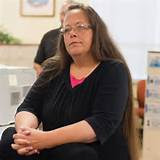Mormon Leader Chides Clerk Kim Davis
The Mormon Church has been among the most vocal in expressing worry that the expanded rights of LGBT people — among other liberalizing changes in the United States — are trumping those of religious Americans who may disagree with gay equality. On Tuesday, the church offered its first high-level comments on perhaps the most contentious case in that realm, saying through a top leader that Kentucky county clerk Kim Davis erred and that more balance, tolerance and civility are needed when it comes to protecting religious freedom.
Dallin Oaks, a member of the Twelve Apostles of the Church of Jesus Christ of Latter-day Saints, laid out what should be seen as the church’s official view in a lecture Tuesday to the Sacramento Court-Clergy Conference, an event sponsored by Sacramento area judges and the Sacramento Superior Court. Oaks was a law clerk to U.S. Supreme Court Chief Justice Earl Warren, a prosecutor in Illinois and a Utah state Supreme Court justice.
[Here is a link to Oaks’ lecture]
Oaks’s talk, called “The Boundary Between Church and State,” echoes in its conciliatory tone other recent efforts by the Mormon Church on this topic, including a compromise the church and its allies worked out in Utah with gay rights advocates earlier this year.
The talk reflects the Mormon Church’s desire not to be associated with divisive culture wars, particularly after it became highly involved in fighting gay marriage in California in the late 2000s and took a serious public relations bruising for it, in part by Mormons who didn’t want to see their church so intertwined with politics.
It also shows the way the Davis’s case is bringing out the nuances among the religious liberty crowd. The movement, with religious conservatives as its most vocal proponents, can seem monolithic, but divisions over the Davis case revealed different views and strategies. Some prominent religious freedom advocates said Davis had gone too far in refusing not only to issue marriage licenses to gay couples but in barring her staff from doing so as well.
The Vatican took pains after Pope Francis met with Davis last month during his U.S. trip — a visit that triggered huge controversy — to clarify the meeting. It “should not be considered a form of support of her position in all of its particular and complex aspects,” the Vatican statement read.
[Mormons, LGBT advocates make news with compromise on gay/religious rights]
While some prominent figures in the religious liberty movement — including the president of the U.S. Conference of Catholic Bishops — had spoken sympathetically of Davis, other notable figures were silent, or said she had gone beyond the bounds of her rights.
Paul Edwards, editor of the Mormon Church-owned Deseret News, a major Utah news source, said Mormons and others will take note at a prominent player in the religious liberty scene saying “we do see boundaries. Some may have misinterpreted a strong support for quote-unquote religious liberty as being obstructionist.” The Church, he said “plays a catalyzing role in religious liberty circles.”
The talk urged compromise and mutual respect. Both sides should seek balance, “not total victory,” Oaks said. “It will help if we are not led or unduly influenced by extreme voices that are heard from contending positions.”
“There should be no adversariness between believers and non-believers, and there should be no belligerence between religion and government. These two realms should have a mutually supportive relationship,” he said, according to a transcript.
“I reject the idea of a wall between church and state. The more appropriate metaphor to express that relation—reinforced by various decisions of the United States Supreme Court—is a curtain that defines boundaries but is not a barrier to the passage of light and love and mutual support from one side to another,” he said.
On the Davis case, Oaks said public officials “take an oath to support the constitution and laws of their jurisdiction. That oath does not leave them free to use their official position to further their personal beliefs— religious or otherwise—to override the law.” However, Edwards noted, Oaks said it was a “far more significant violation of the rule of law” when governors or attorney generals refuse to enforce a law with which they disagree, either on secular or religious grounds.
This was, Edwards said, “a not-so-subtle jab” at President Obama and some state officials who refused to defend their own marriage laws when those laws discriminated against gay couples. Oaks’s “principle cuts against culture warriors on all sides,” he said.


Comments